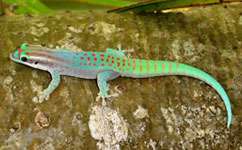Invasive night geckos outcompete local day geckos

The nocturnal house gecko is an aggressive island invader with a bad reputation when it comes to interaction with the locals. House geckos have already contributed to the demise of many similar species active during the night.
Now researchers have found that in Mauritius they outcompete geckos that come out during the day as well.
The isolation of oceanic islands nurtured the evolution of many distinctive animals and plants, perfectly adapted to their unique habitat. But it left them unprepared for the onslaught that arrived with the first boats of explorers. The list of extinctions is depressingly long.
Ship rats and cats are amongst the worst enemies of many island creatures that did not evolve strategies against invaders, but the common house gecko comes close. Although it's harmless enough in its native Asia, the house gecko (Hemidactylus frenatus) quickly has been linked to the demise of other geckos on many islands.
"In Mauritius we have found that the house gecko has contributed to the loss of endemic night gecko species, which can now only be found on a few islands that have not yet been invaded," says Nik Cole, a conservation biologist working on the island.
Mauritius has suffered more than its share since the arrival of the first explorers in 1598. The flightless dodo bird was one of the first victims and today less than two percent of the original habitat remains. Of the original 17 reptile species, five are gone forever and the rest are either restricted to offshore islets or in decline, or both.
Adding to the troubles, Cole, Stephen Harris and their colleagues of the Mauritian Wildlife Foundation also noticed that the local ornate day geckos (Phelsuma ornata) are less common in areas invaded by the house geckos. When they looked closer, they spotted house geckos foraging during the day and diurnal geckos occasionally walking about at night.
Interactions between nocturnal and diurnal species are not usually thought to be a problem, because they live and eat at different times of the day. But Cole was not convinced and set out to determine if the introduced house gecko was implicated in the fall of the ornate day geckos.
To do that, Cole counted how many geckos were active on the walls of abandoned buildings over six periods of 24 hours and repeated the procedure in each season throughout the year. Cole also examined the stomach content of adult males to see what the two gecko species were eating (mainly insects and spiders) and quantified how much prey was available year around.
What Cole and Harris found was strong evidence for competition: "both species ate similar invertebrate prey items and although the house geckos were smaller they ate similar sized prey items," says Cole. This means that the house gecko is competing indirectly with the day gecko by consuming its preferred food supply and forcing it to shift its diet.
Competition was especially fierce during the warm dry season, when nectar and other food plants are not available and the geckos have to rely on insects, spiders and other invertebrates.
"Our main finding has been that the introduced house gecko, which is implicated in the decline and loss of other nocturnal geckos, may also be affecting diurnal geckos," concludes Cole.
The results, published in Biological Invasions, confirm that house geckos are a serious conservation problem in Mauritius and elsewhere. "With ever increasing traffic around the world the gecko is likely to continue its invasion to new locations," he adds.
This story is republished courtesy of Planet Earth online, a free, companion website to the award-winning magazine Planet Earth published and funded by the Natural Environment Research Council (NERC).
More information: Nik C. Cole and Stephen Harris, Environmentally-induced shifts in behavior intensify indirect competition by an invasive gecko in Mauritius, Biological Invasions, published Friday, May 20, 2011, doi:10.1007/s10530-011-0025-8
Provided by PlanetEarth Online

















